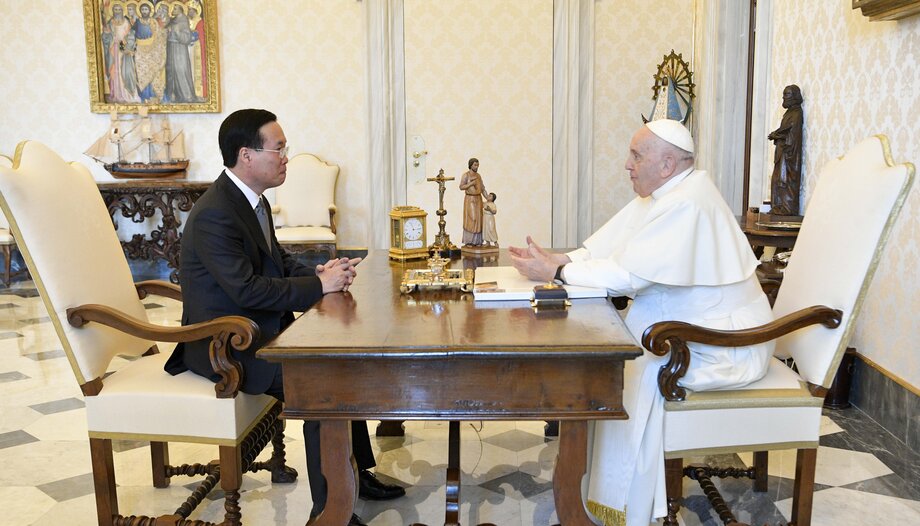 Pope Francis sends economic aid to Haiti, Bangladesh and Vietnam
Pope Francis sends economic aid to Haiti, Bangladesh and Vietnam Pope Francis, a diplomacy with a view to China?
Pope Francis, a diplomacy with a view to China?This agreement is a step forward towards the normalization of diplomatic relations, which will only happen at the end when the agreement for the exchange of ambassadors is defined. But it is an important step forward, considering that it has been reached after very long negotiations, ten meetings of a joint Vietnam-Holy See committee made at the level of "deputy foreign ministers", an agreement for the appointment of bishops and the presence, already since 2011, of a non-resident representative of the Holy See in Vietnam, who has been nuncio in Singapore from the beginning.
If, therefore, Vietnam is not yet the 185th State to maintain full diplomatic relations with the Holy See, the fact that there is a resident representative is a not inconsiderable step forward. In fact, it may even be an important precedent as far as relations between the Holy See and China are concerned. It is well known, in fact, that Cardinal Pietro Parolin, the Vatican Secretary of State, is pushing for a resident representative of the Holy See in Beijing, not to establish diplomatic relations, but at least to have a Holy See presence that can closely observe the situation of Christians and work with the Beijing government to ensure that the situation of Christians and the position of the Holy See are well understood.
An agreement with a Chinese perspective?
Of course, comparing China and Vietnam is not quite correct. In Vietnam there are 8 million Catholics, 6.7% of the population, and the "specific weight" of the Catholic population in the country is very strong. Relations with the government have fluctuated from open persecution to dialogue to religious freedom issues that have threatened to undermine even the work done to normalize diplomatic relations.
However, there are also similarities that should not be underestimated.
Vietnam is a socialist republic, like China. As in the case of China, also in Vietnam the key figure in the redefinition of diplomatic relations was Cardinal Etchegaray. He officially visited the country in 1989, paving the way for subsequent visits by a series of papal delegations to Vietnamese dioceses. And even with Vietnam, the Holy See was able to initiate a path of normalization that began with an agreement on the appointment of bishops, which was in some ways a precursor to the agreement with China.
The Vietnamese model for the appointment of bishops works as follows: there is a period of consultation, at the end of which the papal representative sends the results to the Congregation for the Evangelization of Peoples, which continues to have jurisdiction over Vietnam. The latter finalizes the list of three candidates, which is presented to the Pope, who makes his choice. Only after the election of the Pope, the Holy See discusses the selected candidate with the Vietnamese government. The Vietnamese government examines the candidacy and finally accepts the candidate. The Holy See then announces the appointment of the bishop.
We do not know what the Chinese model is like, the fruit of an interim agreement, but it is plausible that the procedure does not deviate much from this agreement. This agreement was also favored by Cardinal Pietro Parolin, in 1996, when he was Undersecretary for Relations with States, i.e., Vice Minister of Foreign Affairs of the Vatican.
Now, Vietnam is taking a step closer to full diplomatic relations by accepting a resident representative of the Holy See in Hanoi. And one wonders if China will also take this step in the near future.
The protocol between Vietnam and the Holy See
In the communication announcing the protocol, it was stated that "in talks between President Vo Van Thuong and Pope Francis, and Cardinal Secretary of State Pietro Parolin respectively, the two sides expressed their great appreciation for the remarkable progress in relations between Vietnam and the Holy See, and the positive contributions of the Catholic Community of Vietnam so far."
In addition, "both parties expressed their confidence that the Pontifical Resident Representative will fulfill the requirements of the role and mandate granted in the Agreement, provide support to the Vietnamese Catholic community in its commitments in the spirit of the law and, always inspired by the Magisterium of the Church, to fulfill the vocation to 'accompany the nation' and be 'good Catholics and good citizens', and contribute to the development of the country, while the representative will be a bridge to advance relations between Vietnam and the Holy See."
Relations between the Holy See and Vietnam
Since 1975, when the Apostolic Delegate to Vietnam was expelled by the communist government, there has been no permanent representative of the Holy See in Vietnam.
The current non-resident representative is the nuncio to Singapore, Archbishop Marek Zalewski, who has visited Vietnam frequently in recent years, continuing the bridging work begun by his predecessor, Archbishop Leopoldo Girelli, the first non-resident representative of the Holy See in Hanoi. Negotiations have lasted 14 years, with ten meetings that have seen a continuous solidification of relations.
Moreover, if in 2018 Caritas Vietnam was able to celebrate the tenth anniversary of its reopening after 32 years of forced closure by the communist regime, it is also due to this difficult work of dialogue.
Vietnam is a land of martyrs. One of its best known saints is Cardinal François Xavier Van Thuan, who spent thirteen years in prison, nine of them in solitary confinement, and then was called to the Vatican to serve first as vice president and then as president of the Pontifical Council for Justice and Peace.











